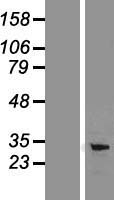PD L1 (CD274) (NM_014143) Human Tagged ORF Clone
CAT#: RC213071
PD-L1 / CD274 (Myc-DDK-tagged)-Human PD-L1 / CD274 molecule (PD-L1 / CD274)
"NM_014143" in other vectors (6)
Specifications
| Product Data | |
| Type | Human Tagged ORF Clone |
| Tag | Myc-DDK |
| Symbol | CD274 |
| Synonyms | B7-H; B7H1; hPD-L1; PD-L1; PDCD1L1; PDCD1LG1; PDL1 |
| Vector | pCMV6-Entry |
| E. coli Selection | Kanamycin (25 ug/mL) |
| Mammalian Cell Selection | Neomycin |
| Sequence Data |
>RC213071 representing NM_014143
Red=Cloning site Blue=ORF Green=Tags(s) TTTTGTAATACGACTCACTATAGGGCGGCCGGGAATTCGTCGACTGGATCCGGTACCGAGGAGATCTGCC GCCGCGATCGCC ATGAGGATATTTGCTGTCTTTATATTCATGACCTACTGGCATTTGCTGAACGCATTTACTGTCACGGTTC CCAAGGACCTATATGTGGTAGAGTATGGTAGCAATATGACAATTGAATGCAAATTCCCAGTAGAAAAACA ATTAGACCTGGCTGCACTAATTGTCTATTGGGAAATGGAGGATAAGAACATTATTCAATTTGTGCATGGA GAGGAAGACCTGAAGGTTCAGCATAGTAGCTACAGACAGAGGGCCCGGCTGTTGAAGGACCAGCTCTCCC TGGGAAATGCTGCACTTCAGATCACAGATGTGAAATTGCAGGATGCAGGGGTGTACCGCTGCATGATCAG CTATGGTGGTGCCGACTACAAGCGAATTACTGTGAAAGTCAATGCCCCATACAACAAAATCAACCAAAGA ATTTTGGTTGTGGATCCAGTCACCTCTGAACATGAACTGACATGTCAGGCTGAGGGCTACCCCAAGGCCG AAGTCATCTGGACAAGCAGTGACCATCAAGTCCTGAGTGGTAAGACCACCACCACCAATTCCAAGAGAGA GGAGAAGCTTTTCAATGTGACCAGCACACTGAGAATCAACACAACAACTAATGAGATTTTCTACTGCACT TTTAGGAGATTAGATCCTGAGGAAAACCATACAGCTGAATTGGTCATCCCAGAACTACCTCTGGCACATC CTCCAAATGAAAGGACTCACTTGGTAATTCTGGGAGCCATCTTATTATGCCTTGGTGTAGCACTGACATT CATCTTCCGTTTAAGAAAAGGGAGAATGATGGATGTGAAAAAATGTGGCATCCAAGATACAAACTCAAAG AAGCAAAGTGATACACATTTGGAGGAGACG ACGCGTACGCGGCCGCTCGAGCAGAAACTCATCTCAGAAGAGGATCTGGCAGCAAATGATATCCTGGATT ACAAGGATGACGACGATAAGGTTTAA >RC213071 representing NM_014143
Red=Cloning site Green=Tags(s) MRIFAVFIFMTYWHLLNAFTVTVPKDLYVVEYGSNMTIECKFPVEKQLDLAALIVYWEMEDKNIIQFVHG EEDLKVQHSSYRQRARLLKDQLSLGNAALQITDVKLQDAGVYRCMISYGGADYKRITVKVNAPYNKINQR ILVVDPVTSEHELTCQAEGYPKAEVIWTSSDHQVLSGKTTTTNSKREEKLFNVTSTLRINTTTNEIFYCT FRRLDPEENHTAELVIPELPLAHPPNERTHLVILGAILLCLGVALTFIFRLRKGRMMDVKKCGIQDTNSK KQSDTHLEET TRTRPLEQKLISEEDLAANDILDYKDDDDKV |
| Chromatograms |
CHROMATOGRAMS
 Sequencher program is needed, download here. |
| Restriction Sites |
SgfI-MluI
Cloning Scheme for this gene
Plasmid Map

|
| ACCN | NM_014143 |
| ORF Size | 870 bp |
| OTI Disclaimer | Due to the inherent nature of this plasmid, standard methods to replicate additional amounts of DNA in E. coli are highly likely to result in mutations and/or rearrangements. Therefore, OriGene does not guarantee the capability to replicate this plasmid DNA. Additional amounts of DNA can be purchased from OriGene with batch-specific, full-sequence verification at a reduced cost. Please contact our customer care team at custsupport@origene.com or by calling 301.340.3188 option 3 for pricing and delivery. The molecular sequence of this clone aligns with the gene accession number as a point of reference only. However, individual transcript sequences of the same gene can differ through naturally occurring variations (e.g. polymorphisms), each with its own valid existence. This clone is substantially in agreement with the reference, but a complete review of all prevailing variants is recommended prior to use. More info |
| OTI Annotation | This clone was engineered to express the complete ORF with an expression tag. Expression varies depending on the nature of the gene. |
| Product Components | The ORF clone is ion-exchange column purified, transfection-ready dried plasmid DNA, and shipped with 2 vector sequencing primers. |
| Reference Data | |
| RefSeq | NM_014143.1, NM_014143.2, NM_014143.3 |
| RefSeq Size | 1553 bp |
| RefSeq ORF | 873 bp |
| Locus ID | 29126 |
| Domains | ig, IG |
| Protein Families | Druggable Genome, Transmembrane |
| Protein Pathways | Cell adhesion molecules (CAMs) |
| MW | 33.28 kDa |
| Gene Summary | This gene encodes an immune inhibitory receptor ligand that is expressed by hematopoietic and non-hematopoietic cells, such as T cells and B cells and various types of tumor cells. The encoded protein is a type I transmembrane protein that has immunoglobulin V-like and C-like domains. Interaction of this ligand with its receptor inhibits T-cell activation and cytokine production. During infection or inflammation of normal tissue, this interaction is important for preventing autoimmunity by maintaining homeostasis of the immune response. In tumor microenvironments, this interaction provides an immune escape for tumor cells through cytotoxic T-cell inactivation. Expression of this gene in tumor cells is considered to be prognostic in many types of human malignancies, including colon cancer and renal cell carcinoma. Alternative splicing results in multiple transcript variants. [provided by RefSeq, Sep 2015] |
Documents
| Product Manuals |
| FAQs |
| SDS |
Resources
Other Versions
| SKU | Description | Size | Price |
|---|---|---|---|
| SC115168 | PD-L1 / CD274 (untagged)-Human PD-L1 / CD274 molecule (PD-L1 / CD274) |
USD 310.00 |
|
| RG213071 | PD-L1 / CD274 (GFP-tagged) - Human PD-L1 / CD274 molecule (PD-L1 / CD274) |
USD 460.00 |
|
| RC213071L1 | Lenti ORF clone of Human CD274 molecule (CD274), Myc-DDK-tagged |
USD 768.00 |
|
| RC213071L2 | Lenti ORF clone of Human CD274 molecule (CD274), mGFP tagged |
USD 620.00 |
|
| RC213071L3 | Lenti ORF clone of Human CD274 molecule (CD274), Myc-DDK-tagged |
USD 768.00 |
|
| RC213071L4 | Lenti ORF clone of Human CD274 molecule (CD274), mGFP tagged |
USD 768.00 |
{0} Product Review(s)
Be the first one to submit a review






























































































































































































































































 Germany
Germany
 Japan
Japan
 United Kingdom
United Kingdom
 China
China



